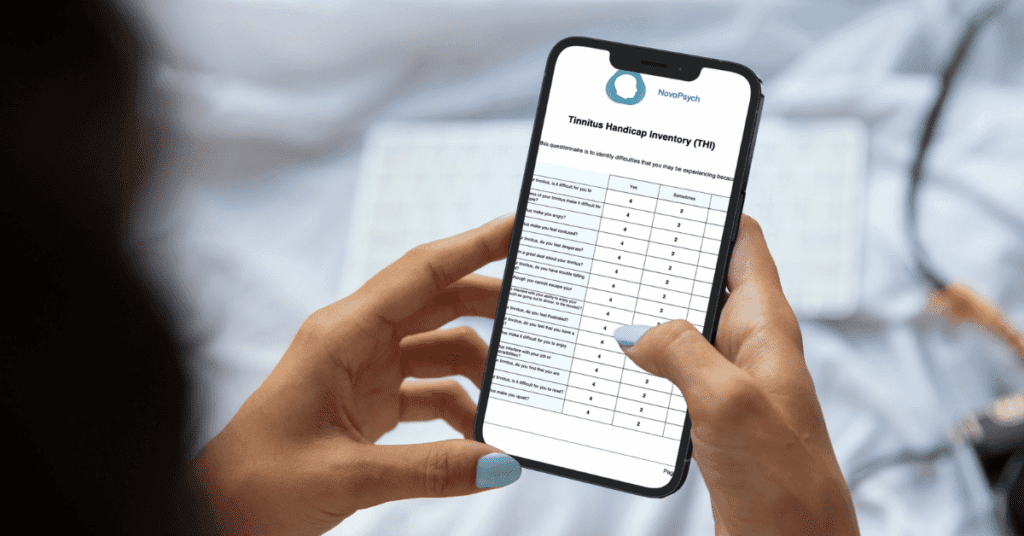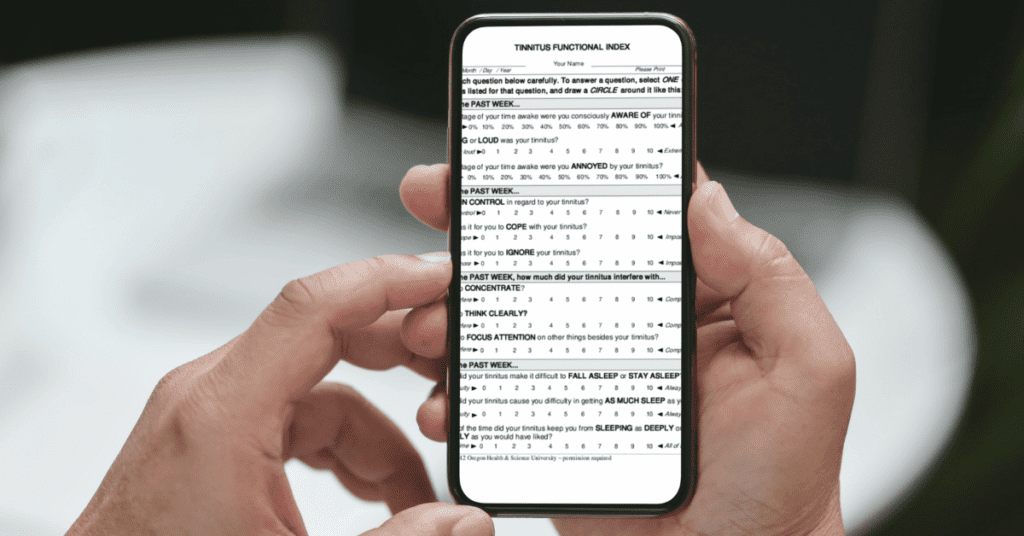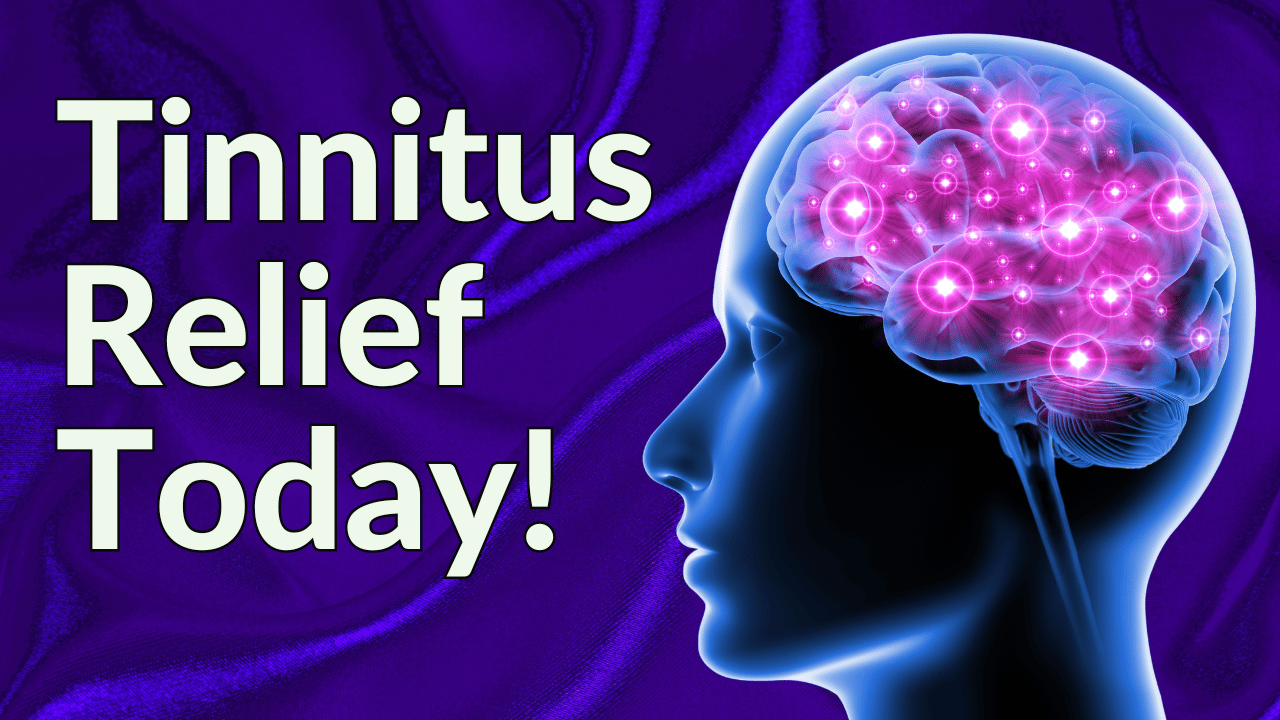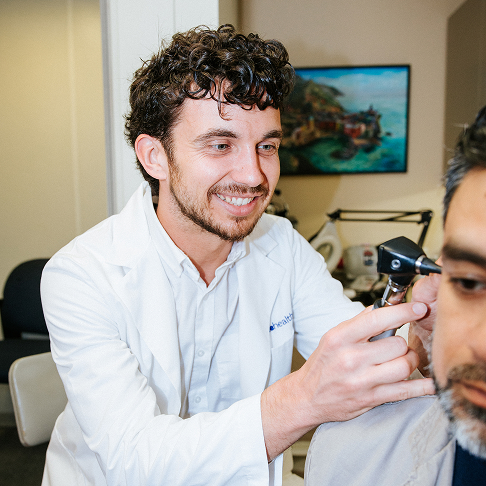Tinnitus is an ear condition that is unique among others of its kind, in that tinnitus distress is self-reported and diagnosis relies heavily upon self-reported tinnitus symptoms. That being said, are all tinnitus questionnaires created equal? While there are a handful of clinically validated and accurate questionnaires evaluating tinnitus symptoms, there are some important distinctions to be made between a tried and true questionnaire such as the Tinnitus Functional Index and simple online questionnaire that has been created by people outside of the Audiology profession, or without expertise regarding hearing health and related conditions. Let’s take a closer look at the different types of tinnitus questionnaires currently available.
What Are Subjective Questionnaires?
Subjective questionnaires are those that are used to evaluate tinnitus severity, rather than the presence of tinnitus itself. Tinnitus severity is important to identify, because people with severe tinnitus are more likely to experience disruptions to their day to day lives. Chronic tinnitus and acute tinnitus can both fall under the umbrella evaluations of subjective questionnaires, because both can have varying levels of tinnitus severity. Subjective questionnaires focus less on the actual symptoms of tinnitus, and are more likely to focus on the experiences of having tinnitus, including how you are impacted by tinnitus, whether you have found tinnitus treatments useful, and more.
"Treble Health helped me reduce my tinnitus by about 80%, and now I can live my life again!"

"Treble Health helped me reduce my tinnitus by about 80%, and now I can live my life again!"
– Steve D.
Book a free consultation to learn which Treble Health solution is right for you. Join Steve and thousands more who have found lasting tinnitus relief.
Tinnitus as a whole is also largely subjective, which means that tinnitus questionnaires focus on how an individual is subjectively experiencing symptoms. This can include evaluating as much sleep as an individual is getting, or how tinnitus may be affecting mental health. Now that we know what subjective questionnaires are, we’ll delve deeper into why these types of questionnaires are used.
Why Are Subjective Questionnaires Used?
There are many different phenomena that cannot be registered in an objective way. Pain, emotional reactions, and even general tinnitus cannot be evaluated in a purely objective way. From tinnitus duration to the intensity of symptoms, only the person who has tinnitus can be consciously aware of what is happening. Evaluators cannot hear tinnitus or measure it against objective data points. For that reason, it is vital to use subjective questionnaires to evaluate how tinnitus impacts people, including if they experience difficulty performing day to day tasks, experience upset during quiet resting activities, or even find it difficult to fall asleep or stay asleep.

Objective measurements evaluate the presence of occlusions potentially leading to tinnitus, such as hearing loss, or conditions like pulsatile tinnitus. Subjective measurements, instead, focus on the ways in which tinnitus affects individuals, in order to begin addressing the condition and peeling back the different ways you may see tinnitus interfere with daily life.
Self report questionnaires are invaluable while gathering data for tinnitus, as they help provide insight into self-perceived tinnitus-related handicaps. Tinnitus has the ability to impact mental health and general functioning, and these questionnaires can help identify how often tinnitus patients experience difficulty performing other tasks, and better inform treatment related changes that need to happen to better support those with tinnitus.
How Are Subjective Questionnaires Developed?
Official questionnaires go through a series of steps prior to being identified as useful. The process of weeding out what is and is not useful is called “psychometric evaluation,” which simply means that the questionnaire has been determined to accurately and usefully measure indicators of tinnitus and its impacts. There are different types of validity, including content, face, construct, reliability, and consistency. All of these validity measurement tools must be fulfilled in order to qualify as a valuable tool, such as the Tinnitus Functional Index (TFI), before undergoing the formatting, content development, expert review, testing on intended populations, and revisions stages. This is the most important difference between a legitimate evaluation of tinnitus created by professionals and simple questionnaires found online: the amount of time and energy put into the questionnaires and the clinical trials or clinical research settings involved.
Why Are Subjective Questionnaires Useful For Measuring Tinnitus?
A subjective questionnaire about how tinnitus is functionally impacting a person’s day to day life can be useful because tinnitus has the potential to impact many different areas of one’s life. Sleeping, concentration, emotional health, and even relationship health can all be affected by the presence of tinnitus. Typically, a measurement tool will ask if these issues have presented in the past week, past month, or past six months, in order to determine how likely it is that general living and other tasks are being negatively impacted by tinnitus.
When something cannot be measured objectively, it can be helpful to have a means to quantify the impact it is having on an individual. Questionnaires meet this need by helping patients and practitioners both identify what the symptoms of tinnitus are for a specific individual (or a group of people), and how those symptoms might impact someone’s life. Two commonly used questionnaires are the Tinnitus Handicap Inventory (THI) and the Tinnitus Functional Index (TFI). Many audiologists rely on both, as each questionnaire provides different information about the impact of tinnitus on a person’s life. The TFI, for instance, focuses on all aspects of tinnitus, including how often you are consciously aware of your symptoms, how much emotional distress is present, and how tinnitus presents in your unique case. We will go into greater detail on both questionnaires below. First up: the THI.
Tinnitus Handicap Inventory (THI)

The Tinnitus Handicap Inventory is the smaller of the two questionnaires, and was developed to measure the effects of tinnitus more so than it was developed to measure the severity of the symptoms themselves. The question of how tinnitus interfered with life was at the heart of the questionnaire, rather than the symptoms of the condition itself.
Background And Development
To develop the THI, 45 items were pulled from case histories of patients with tinnitus. This collection was refined and adapted from pre-existing scales used to assess hearing and dizziness, ensuring relevance to the most frequently reported tinnitus symptoms. The inventory underwent a rigorous testing phase with 84 subjects at the Henry Ford Hospital, all of whom were experiencing tinnitus. Items that received unanimous responses were discarded to enhance the scale’s discriminative ability, resulting in a concise and targeted final set of 25 questions.
Scoring
The scoring process used in the THI is fairly straightforward. All questions require that users respond to each question with a yes, a sometimes, or a no answer.
Yes = 4 points, sometimes = 2 points, no = 0 points
The total score is calculated by summing up all 25 responses. Although 100 is the maximum score, a 100 score is not necessary to determine that tinnitus severity is high. The higher the score, the more severe the self-perceived tinnitus related handicap is, allowing patients and practitioners to develop a treatment plan according to patient needs and preferences.
Categories
Category scores are identified as follows, to help determine the severity of tinnitus:
- 0-16 points = No handicap
- 18-36 points = Mild handicap
- 38-56 points = Moderate handicap
- 58-76 points = Severe handicap
- 78-100 points = Catastrophic handicap
Note that these are not clinical diagnoses, but instead are measures used to help both tinnitus patients and practitioners increase understanding of the condition and its effects, develop treatment plans, and evaluate treatment related changes, once treatment has started.
How To Measure Change
One of the main reasons to use questionnaires is to measure treatment impact. When interpreting questionnaire data, you can’t just assume that lower numbers are automatically representative of an improvement. There are statistics that need to be applied in order to determine if a meaningful change has occurred.
Statistical Significance Vs. Clinical Significance
Statistical significance and clinical significance are two different measures. On the THI, a statistical significance that can determine changes on a grand scale requires a 20-point or greater change. A clinical significance, or an individually significant change, requires only a 7-point or greater change.
Screening Version Of Tinnitus Handicap Inventory (THI-S)
In addition to the clinical evaluation of the inventory, there is a screening version used to determine when further tinnitus evaluation is warranted, or when tinnitus may be worsening. Scores range from 0-40. Scores of 6 or below indicate no handicap, while scores of 8 and above reflect some possibility of handicap.
Tinnitus Functional Index (TFI)

The Tinnitus Functional Index is the longer of the two questionnaires, and offers more comprehensive coverage of possible impacts and the symptoms of tinnitus itself. It can be used on its own, or in conjunction with the THI to evaluate the severity of symptoms and the actual experience of having tinnitus.
Background And Development
The TFI was developed with the goal of creating a new index measuring treatment outcomes and individual differences related to multiple domains of tinnitus. This is important, because tinnitus affects far more than just the ears. To develop the TFI, multiple questionnaires were already available. These were evaluated by experts, and 13 content areas were initially developed, though only 8 areas made it into the final inventory.
Sub-scales
There are different sub-scales on the TFI to determine how significant the impact of tinnitus is. Sub-scales include:
- Intrusion
- Sense of control
- Cognition
- Sleep
- Auditory
- Relaxation
- Quality of life
- Emotional
Each of these will be evaluated by the inventory to determine the severity of an individual’s tinnitus.
Scoring
Each item includes a 0-10 rating scale, with 0 representing the least impact and 10 representing the worst impact. Scores for each subscale can be calculated independently, and an overall score can be calculated once all subscales have been calculated.
- 0-17 = Not a problem
- 18-31 = Small problem
- 32-53 = Moderate problem
- 54-72 = Big problem
- 73-100 = Very big problem
How To Measure Change
The TFI identifies clinically meaningful change as a change of 13 points or more. This means that, after tinnitus treatment, a 13-point change indicates the likelihood of successful treatment having taken place.
Tinnitus Questionnaires And Treatment
Ultimately, tinnitus questionnaires are useful tools to help assess both the presence and the severity of tinnitus. Whether using the TFI or THI or a combination of the two, tinnitus questionnaires can be used to help develop a starting point for a tinnitus treatment plan or monitor progress throughout the course of a tinnitus treatment program. These questionnaires help to initially point to the most pressing issues for an individual expressing tinnitus related symptoms and help them work in conjunction with their Audiologist to work towards a common goal of not only alleviating tinnitus symptoms but also improving overall quality of life by reducing the functional impact tinnitus has on daily life.
While you may find a plethora of simple questionnaires online that are available at the click of a button, these cannot take the place of medical advice or professionally and clinically developed questionnaires that have been proven effective, repeatable and reliable. Subjective questionnaires for tinnitus such as the THI and TFI are helpful tools that can be delivered by an audiologist or other hearing health professional to support treatment goals, measure treatment success, and expedite communication between patients and practitioners.
If tinnitus is affecting your daily life, we encourage you to take advantage of our complimentary telehealth consultations. These 20 minute Zoom sessions are a no-strings-attached opportunity to talk with one of our tinnitus specialists, have all of your questions answered, and learn about the different treatment options that would be beneficial for your personal situation. We know how bothersome tinnitus can be, and we want to help you through your journey to habituation. Schedule your free consultation today, and start the path to a life without bothersome tinnitus.
Next Step: Book Free Consultation
- 75% of patients reduced their tinnitus within three months after following our recommendations.
- "I feel like Treble Health literally gave me my life back." - Randy S. (verified customer)
- Join thousands of people who have reduced their tinnitus after scheduling a free consultation.











